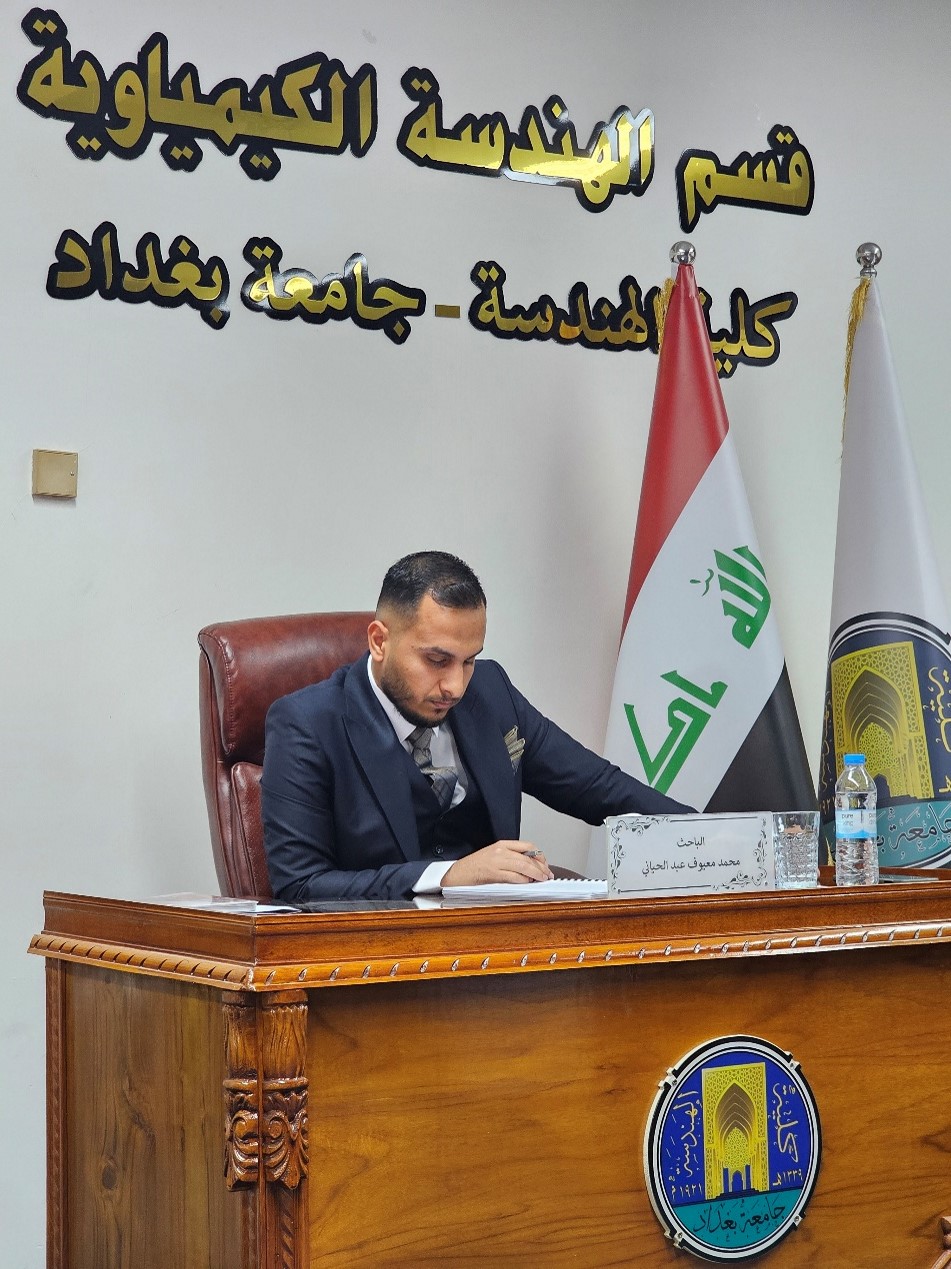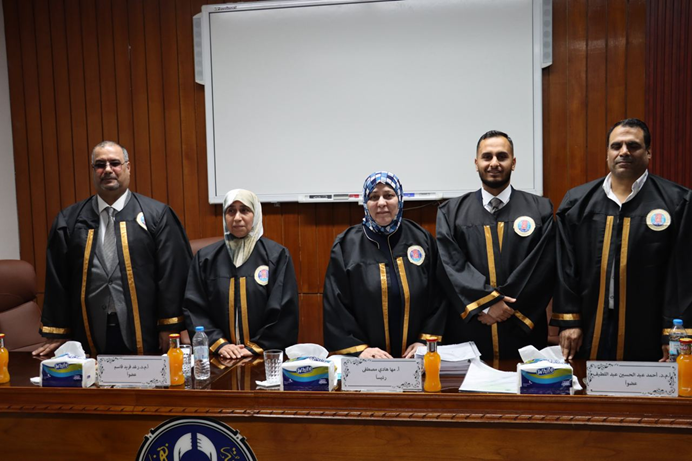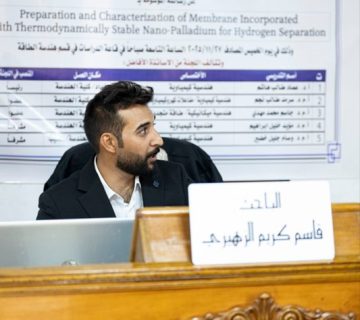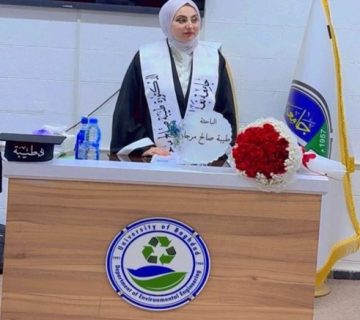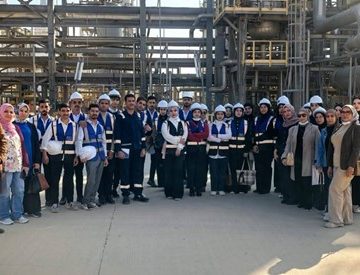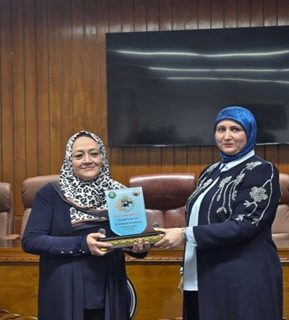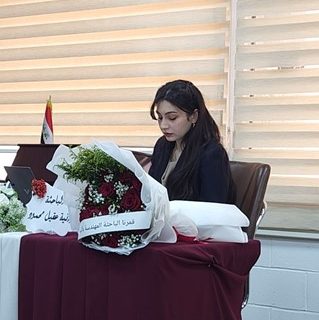The Chemical Engineering Department at the College of Engineering, University of Baghdad, held a M.Sc. thesis examination titled:
“Preparation and Evaluation of a Corn Oil- based Demulsifier for Iraqi Crude Oil Treatment “
By the student Mohammed Mayoof Abed and supervised by Assist. Prof Dr. Tariq Mohammed Naife. The examination committee consisted of Prof. Maha H. Mustafa as Chairman and the membership of Asst. Prof. Dr. Ahmed A. Abdel-Latif, Asst. Prof. Dr. Raghad F. Qasim. After conducting the public discussion and listening to the student’s defense, the thesis was accepted. The thesis was summarized as follows:
Oil emulsions used in the oil industry have been known to increase viscosity, createing difficulties in separating oil from water, disrupting pipeline flow, and posing significant challenges in oil production and refineries. These challenges often lead to various problems and increased unit costs in the oil industry.
Recently, many researchers have focused on finding environmentally friendly demulsifiers because chemical demulsifiers pose a notable environmental danger.
In the current study, two demulsifiers were prepared using commercial and waste corn oil using the Fischer esterification reaction. These demulsifiers underwent a series of characterization tests, such as GC-MS, FTIR, 1HNMR, and TGA, to determine their properties. Following this, the demulsifiers were tested on four different types of oil from Iraqi fields (Basra crude oil, Naft Khana crude oil, East Baghdad S1 crude oil, and Buzurgan crude oil). Several factors were examined, including temperature, settling time, dosage, pH, water content, and the duration of mixing the demulsifiers with oil emulsion.
The demulsifiers synthesized in this study were subject to evaluation on water in oil W/O emulsions with varying pH values (4, 6, 7, 8, and 10) and at different concentrations (blank, 1000, 2000, 4000, and 6000 ppm) for 5 hours at 50°C, 60°C, and 70°C. using three different percentages of water (10%, 30%, and 50%). Demulsifiers were added to emulsions and mixed for one, two, and four minutes, as well as with no mixing. The results obtained indicate that the demulsifiers produced have varying degrees of efficacy in reducing surface and interfacial tensions and breaking water in emulsions of all types of oil from Iraqi fields.
MFK (Demulsifier preparation from commercial Corn Oil) achieved a water separation efficiency of 75% at 2000 ppm for Basra oil emulsion, 43.3% at 4000 ppm for East Baghdad S1, and 35.6% at 4000 ppm for Buzurgan. On the other hand, the WMF (Demulsifier preparation from waste Corn Oil) achieved the best water separation results of 69.3% at 1000 ppm for Basra oil emulsion, 50% at 2000 ppm for East Baghdad S1, and 43.33 % at 4000 ppm for Buzurgan. The emulsions were evaluated for five hours at 70℃, with 30/70 water content, and a duration of two minutes for mixing the demulsifiers. Naft Khanna emulsion was quickly and completely separated using both demulsifiers.
Water separation efficiency was 75% with MFK and 69.9% with WMF, as shown by an analysis of the influence of temperature. The optimum temperature was determined to be 70 degrees Celsius. The influence of pH investigation found that the best result for MFK was at pH = 10 (86.5%), whereas the best result for WMF was at pH = 10 (83.3%). When testing the impact of water concentration, it was found that MFK performed 92% at a water concentration of 50%, whereas WMF performed at 88% also at a water concentration of 50%. Also, the effect of the duration of mixing the emulsion after adding the demulsifier was studied. The best duration for MFK was two minutes with a separation rate of 74%, and the best duration for WMF was two minutes with a separation rate of 71%.

